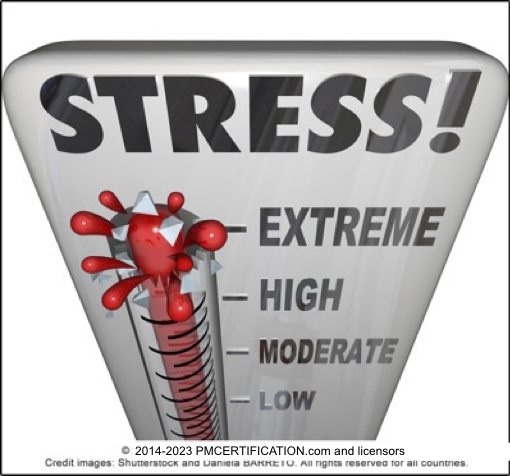You’ve now reached the final week before your PMP® exam. You’re focused on reviewing everything you must know well. Due to your hard work in absorbing all the valuable information in this book, you are now ready to take the PMP® exam – but you may also wonder, “What will the day before the exam and the exam day look like?”

Your stress level will certainly increase and reach a peak. You might be irritable or even panic-stricken. Take comfort in the fact that you are not the only one who has experienced these feelings! There is a lot at stake and it is a perfectly normal reaction. It is important to know that the stress of taking an exam could make you go blank and reduce your ability to recall what you’ve memorized. You may start to worry about forgetting everything you know, such as mixing up EVM acronyms or quality measurement methods.
You will probably want to review all the topics you think you have already forgotten, but this may not be the smartest thing to do. Research has found that performance reaches a peak under moderate stress but starts to plummet when stress levels are high. So, the key to better performance is to reduce stress.
Keeping your mind calm the day before the exam can be counter-intuitive because your natural reflex will be to fight the situation and do more last minute studying in an effort to help you remember all the material. But, this will most likely release stress hormones in your body, which is counterproductive and won’t give you the results you’re hoping to achieve.
The good news is that exam stress can be reasonably managed by following the simple tips and recommendations that we will provide in later sections.
So expect that the day before your exam will be unlike any of your previous study-intensive days, but remember that you have the power to reduce your stress level and improve your performance on exam day.
Myths Vs. Reality: Exam Stress Management
Managing exam stress is discussed in many arenas and there has been tremendous advancement in behavioral science in the last few decades to better understand who will perform at peak and who will under-perform under extreme stress. Along these lines, we want to make sure a few of the myths that we see persisting among exam takers are addressed in this book so we can help you make good stress management decisions.
The following illustration 8.1.2 reveals some of the most common “myths” surrounding exam stress management that have been brought to our attention by our community of students.
As you take time to reflect on these myths, read alumni stories, complete a task list exercise and review tips and recommendations. You will gain perspective and valuable insight into the degree to which you need to change your state of mind and behaviors to position yourself for peak performance on exam day.
